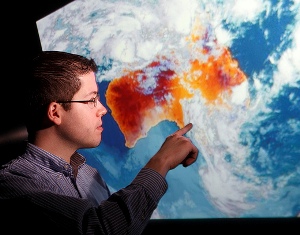Comment: Climate change may cause greater bush fire risk in Australia
Release Date 23 October 2013

Following a record warm winter in Australia, bush fires in New South Wales have caused huge damage to forests and homes. However, arguments over climate change have ignited a political row, with Australian Prime Minister, Tony Abbott, clashing with UN climate officials over the effects of climate change.
So what are the facts? Dr Nick Klingaman, of the University of Reading's Walker Institute and an expert on climate change in Australia, provides the background.
"It is always difficult to attribute a single extreme event, such as the current Australian bush fires, to climate change. Bush fires occur regularly in many parts of Australia due to long dry seasons. However, climate scientists have shown that increasing global temperatures will lead to more frequent and extreme heat waves, which may make Australia more susceptible to wildfires by drying out vegetation and the soil.
"There is still considerable uncertainty over how climate change will influence rainfall in eastern Australia, where the bush fires are currently burning. In Queensland, our research has shown that increased carbon dioxide in the atmosphere will not affect the total amount of rainfall the state receives, but will shorten and intensify the summer wet season while lengthening the winter dry season.
"Australia's southern coasts, particularly in the southwest near Perth, have experienced a trend toward less rainfall over the past 30-40 years, drying out some of the country's most fertile agricultural land. There is growing evidence for human influence in this drying trend, both from the ozone hole over the South Pole and from carbon emissions.
"Through concerted global action to ban CFCs, the ozone hole is slowly recovering. Increasing carbon emissions will offset the benefits from the ozone recovery, however, meaning that southern Australia will likely continue to experience drier conditions in decades to come."